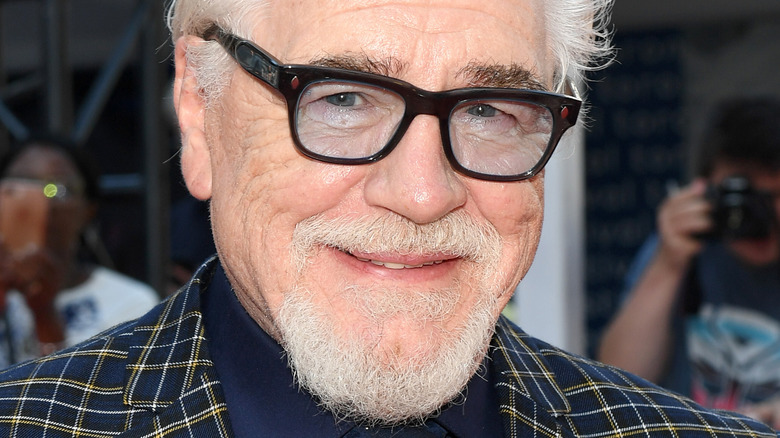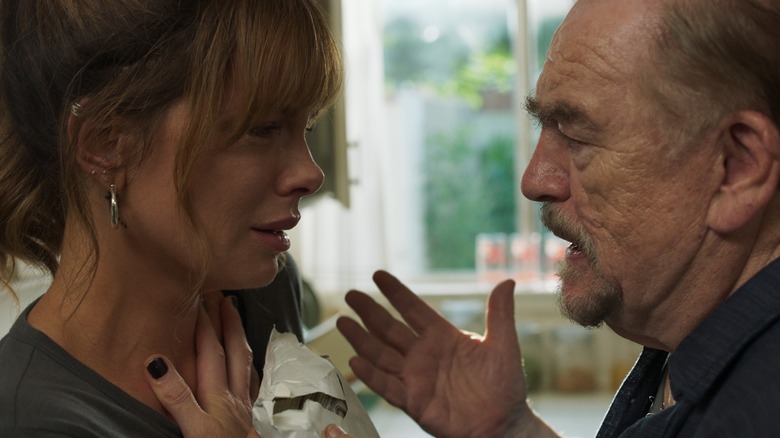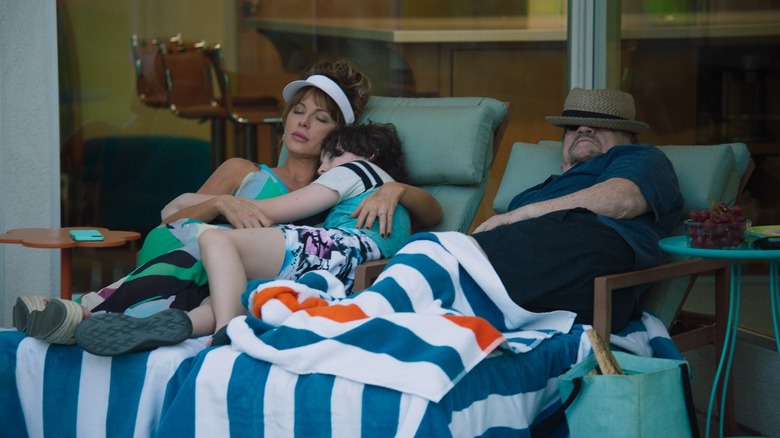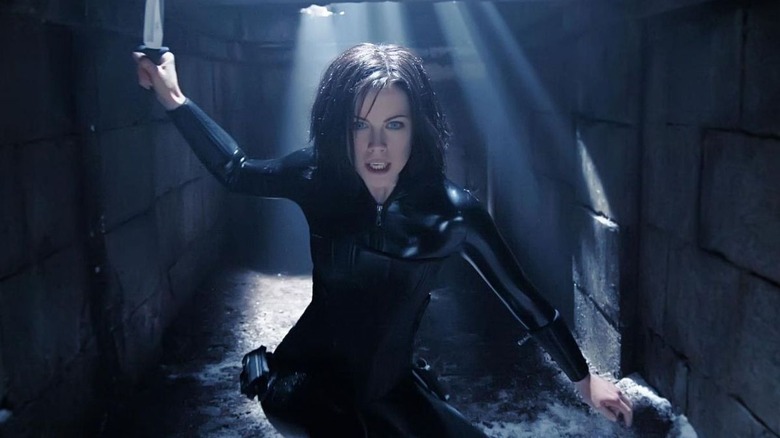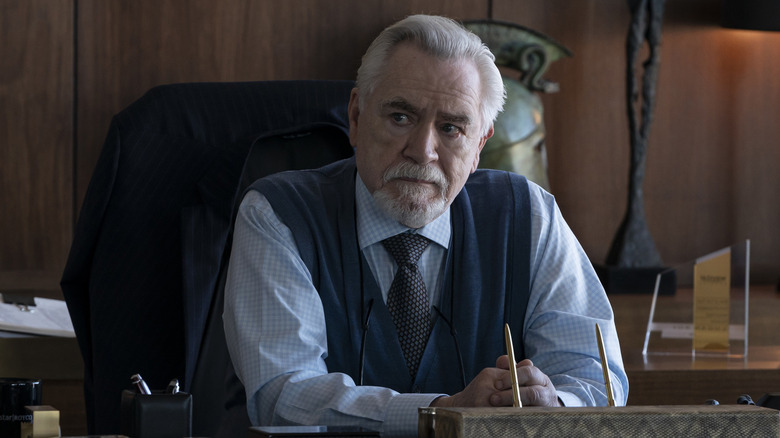Brian Cox And Kate Beckinsale On Their New Film, Prisoner's Daughter - Exclusive Interview
In the new movie "Prisoner's Daughter," from director Catherine Hardwicke ("Twilight"), Brian Cox plays Max, a one-time prize fighter who turned to a life of crime and is now serving time in a Nevada prison. When Max finds out he is ill and has only months to live, he's granted compassionate release on the condition that he stay under house arrest and live with his daughter, Maxine (Kate Beckinsale) — whom he has not spoken with in 12 years.
Maxine, a former Las Vegas dancer, is now relegated to working in a hotel laundry and as a waitress. She does her best to make ends meet, raise her son Ezra (Christopher Convery), and fend off Ezra's father (Tyson Ritter), a violence-prone musician and drug addict who demands to see his son. The last thing that Maxine needs is the return of her estranged father and all his baggage.
A drama about forgiveness, family trauma, and redemption, "Prisoner's Daughter" recently premiered at the Toronto International Film Festival, where Looper spoke with Cox and Beckinsale about the raw, emotional nature of the story. "We laugh a lot," says Cox about preparing to play such intense material. "There's a lot of lightness, and it's a corollary to what we are doing, and [a] necessary corollary, because otherwise it becomes so leaden."
Cox, a beloved character actor for decades, is currently starring in the smash HBO drama "Succession" as ruthless media mogul Logan Roy, with filming on Season 4 now underway. Beckinsale starred last year in the Prime Video thriller "Jolt" and is best known for leading the horror franchise "Underworld," playing a female action hero years before Wonder Woman and Captain Marvel arrived on the big screen.
How Brian Cox and Kate Beckinsale related to these haunted characters
Brian, what spoke to you about this character of Max?
Brian Cox: It's a wonderful role because it's a role [in which] all the effort is inner as opposed to outer, even though it manifests, it comes to a violent end. He becomes physical, but that's all because he's repressing so much. They're the best roles to play because it's all what you don't hear and what you don't see, and you just see the characters in passing. That's the great gift of the role. From an acting point of view, it is a gift.
Also, it's a double gift working with this one [gestures toward Beckinsale]. That helps it as well. But it was a really interesting role in that way. There was nothing forced about it from the word go. That's also to do with Mark Bacci's writing. The character is not forced. He comes on, he has a serious death sentence with his illness, and he's saying, "I just need to complete some part of my life in relationship to my child, to my daughter." I thought it was a lovely thing to do, and working with Kate made it even doubly lovely.
Kate, your character is a very recognizable everyday person struggling to pay the bills and provide opportunities for her son. What did you relate to the most in reading the script?
Kate Beckinsale: She's a woman who's got so much that's coming at her constantly, that's difficult and brutal and hard. She's coping, but she's an incredibly vulnerable person. She's had to become someone who is a fighter and takes on all this responsibility and fights the fight. But it takes her father — who she's estranged from and hates, basically — to come back, and he sees her vulnerability, which she at first finds incredibly uncomfortable.
That's the thing — she's terribly wounded, but she's closed off and it's forced open some old relationships and old wounds and all that. It's very important for her [for] that to happen. She's in a grief-stricken state that she's not even aware of because of basically losing both of her parents and all her hopes and dreams. And actually, by the end of the movie, she gets to make her peace with it. That's his gift to her.
Brian Cox hasn't done prison time, but he knows guys who have
Brian, for a role like Max, would you talk to ex-cons or people who have had prison experiences? Or do you just go by your own intuition and the script?
Cox: I know people who've been to prison, and I was aware of people who [were] going to prison when I was very young. I could see some of the less attractive of my classmates at school — not necessarily in my class, but people who could be quite violent — I could see them ending up in a certain way. I was always aware of that because I absolutely loathe violence and I can't be dealing with it in any shape or form.
You do try to understand what makes one behave the way they behave. A lot of it is to do with repression — how you repress what you feel, how you repress who you are.
It makes it, from the acting point of view, so much easier to play because it's an open book; you can just do it. You use your imagination. What is it like to be deprived? What is it like to be in that kind of situation? I've played a few people in that boat. ... [Max's] illness is going to carry him off, but he needs to make this peace with his daughter. It's the most important thing in his life. He can't leave this life without having made peace and having [made] sure that she's going to be okay.
When the two of you are doing these raw, emotional scenes, how do you prepare for those?
Cox: We laugh a lot. What we do is we enjoy what we do. There's a lot of lightness, and it's a corollary to what we are doing, and [a] necessary corollary, because otherwise it becomes so leaden. You have to keep it up there; you have to keep the air [in] it. You've got to keep the air to keep the ball in the air; you've got to do that no matter how desperate [what] you're dealing with [is].
When you do that, there's more possibilities in the playing. There's more possibilities in the range of what you do. When you work with somebody like Kate, that's the big advantage because she plays the same game, so it's so easy. It really is. You've done your own homework, she's certainly done her homework, and you come together in a harmony.
Kate Beckinsale on how Underworld was a game changer
Kate, you led an action-horror franchise for five films at a time when women weren't getting those opportunities. Looking back now, do you see what you did with the "Underworld" series as groundbreaking?
Beckinsale: I do think that at the time when I made that movie, there was a lot of quite worried conversations about "It's a female lead. Will anyone go for it?" I'm aware that those are not conversations that are being had at all in the same way now. It's normal. Young girls are now very used to there being female-led action movies and superhero movies. I'm really glad to have been a part of moving that out of the conversation. I'm glad that that's what that was for.
Cox: She was certainly a groundbreaker in that way. That was key, and that's very important in shifting the parameters of how we deal with women in cinema. That's become so much more sophisticated and so much truer. They're not just adjuncts, which for a long time they were. There were great films and there's great actresses, like Katie Hepburn and what have you, who certainly you would never describe as an adjunct. She would never allow that in a million years. The climate was so tough for those women, and [Kate's] helped smash that climate, a great contribution.
What lies ahead for Logan Roy on Season 4 of Succession?
Brian, you're shooting Season 4 of "Succession" now. Did you have expectations of where you wanted Logan to go this season? How did [creator] Jesse Armstrong and the writers' plans match those?
Cox: Where I want Logan to go and where the writers want Logan to go are two entirely different things. I'm a bit possessive about Logan, so I have to constantly bow to the deference of the writers: "Oh, you want to take him there, do you? Okay, we'll go there." I don't always agree with it, but it's not my job. My job is to do what they've written, and my job is to realize what they've written. It's nothing to do with what my feelings are. It's what the story is and what the character is and what they've created. That's the deal. That's what you accept, especially when you have great writers.
When you're working with great writers, you've got to accept that, because quite a lot of the time when you work with bad writers, you're dotting the I's and crossing the T's. You're doing all that yourself. In this case, there is absolutely not any point to that, because these writers are formidable.
You said recently that you want the show to have a finite end. You don't want it to go on and on.
Cox: I think anything that's good has its sense of completion [and] sense of totality. I've been accused of attacking "Billions," but I didn't attack "Billions." I just said there are shows which have gone on for other seasons. I haven't seen "Billions," so I don't know. Paul Giamatti's an old pal of mine, and so [is] Damian Lewis. In fact, Damian was in "The Escapist" with me and played the villain in it.
Each show has its own lifeline, but it's also up to the writers. Where do you go with that show? Where do you take the show? Jesse is a genius at that. He's very rigorous. It's a British thing as well, that kind of rigor that they've got about their work.
So my feelings about Logan Roy don't come into the picture. It's about what the writers want, and you have to go down that road. ... Of course, I've got my own feelings. I feel, "I could have done that. I could have done this." I would actually be a lot harder with him, to be honest with you. I would certainly be harder in [relation] to his children. I would give them f***-all, quite frankly.
"Prisoner's Daughter" premiered last week at the Toronto International Film Festival.
This interview has been edited for clarity.
